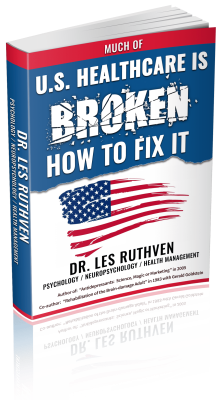Last updated on January 6th, 2024 at 08:33 am
Is Managed Care really interested in better healthcare and lower cost?
This article goes well beyond the popular belief that managed care is primarily out to saving money by denying payment for needed services, which in a way the writer endorses. However, my criticism of the failure of current managed care goes well beyond the above but the alternative, as some suggest, of no third party review of the delivery of health services is equally domed for failure much as in the present system. No matter what we call an effective 3rd party review of services, for lack of a better name, I will call it a Science-based Managed Care (SBMC) system. The current managed care iteration is based on a narrow, biased view of health, one which neglects major contributors to our health/illness and often managed care reviewers are not competent to review many services, especially mental health services and diseases that are preventable for the most part.
First some background about the current system and why we have so much poor quality, often inappropriate, costly healthcare, care that typically does not threat the causes of the majority of our health problems (I call this back end treatment) and care that is often iatrogenic or physician caused health problems.
How did we get to so much poor quality and costly healthcare?
Unfortunately we have a healthcare system—and most if not all of the current health entities—are shaped by physicians who control almost every aspect of the health industry. Physicians are trained at every level—college, medical school, internship, training for board certification—in the biological and physical sciences, and this training is best geared for treating the bio physical conribution to disease and not to the majority of health problems that bring most of us to our physicians.
Two health professionals-researchers—one an internist and one a psychologist— studied the 14 most common symptoms that bring people either to a physician or to a psychiatrist or psychologist for help. 1000 such patients with one or more of these common symptoms came to a physician and on the basis of the history and physical examination the physician could not diagnose a disease or a diagnosable mental health disorder to account for the patient’s symptoms. All of these patients then received extensive lab work and other diagnostic procedures until either a disease was diagnosed or a non-organic cause was found to account for the patient’s health problem. Unfortunately society and physicians as well overestimate the frequency of disease in the healthcare population and in this research of these 1000 patients only 9.5 % with one or more of these common were eventually found to have a disease! This bio physical training predisposes physicians to treat disease when in fact most of us have health problems are caused by non-organic factors, including our own health-injurious behavior.
Major preventable diseases which are often poorly treated by physicians
The following are just a few example of the need for a new, science-based managed care system (SBMC) designed to treat the whole health problem and not just the bio physical contributions to disease.
Among other health problems let’s consider heart disease, cancer and Type 2 diabetes as being partly or largely preventable, although certainly genetic predispositions play an important role in their expression. All of these millions of patients are treated with a combination of Primary Care Physicians and specialist physicians, all of whose training has been essentially in the bio physical sciences. However, these patients’ diseases are a combination of organic and non-organic factors, the latter such as stress, overweight or obesity, insufficient exercise/activity, poor nutrition, distressing life situations and other non-organic factors impairing one’s health.. Moreover, these patients’ physicians have had little or no training in the contribution of these non-organic causes to their patients’ health problems. At the very least when patients are given such a major and life altering diagnosis such as cancer and others, these patients are in severe stress, which augments their health problems. Rather than having these non-organic health factors treated by those trained to do so, physicians inappropriately prescribe psychiatric drugs instead under the false notion that these drugs are addressing any psycho social factors operating in the patient’s illness. To address the inadequacies of current managed care, the new system of managed care, as well as the corresponding health plan designs, will not allow physicians to prescribe psychiatric drugs to patients whose health problems are outside the physician’s training and expertise. Physicians must refer these patients to the appropriate carve out for diagnosis and treatment of these non-organic caused health problems contributing to their disease. Overweight and obesity are very prevalent in these and other diseases and must be addressed by those who are expert in treating these health problems. No, weight loss drugs have proven to be ineffective for 75 years but physicians continue to prescribe these drugs despite the poor outcomes of weight loss dugs.
The new, science-based managed care will not allow non-psychiatric physicians to diagnose mental disorders and prescribe psychiatric drugs to these patients
80% of psychiatric drugs are prescribed by non-psychiatric physicians and this will not be allowed by the new managed care and new health plans. Psychiatry and the pharmaceutical industry have convinced many of these non-psychiatric physicians that mental disorders are diseases are best treated by drugs. Physician training in the mental disorders is pretty much restricted to a 6-week rotation in psychiatry during their clinical internship, which unfortunately is restricted to the narrow field of biological psychiatry, which has pretty much taken over the whole field of psychiatry. Health plans that allow non-psychiatric physicians to diagnose, and much less treat mental disorders trivializes the training required to competently diagnose the full range of the mental disorders or indeed the non-organic factors involved in the patient’s health problems. A physician going to the Diagnostic and Statistical Manual and counting the number of the patient’s symptoms to establish a diagnosis and prescribe a drug is ludicrous and foolhardy. First, the one who makes such a diagnosis must have at the very least extensive training in the full range of the mental disorders from adjustment problems to schizophrenia and general physicians have little of this knowledge in their training. For example, going to the Diagnostic Manual and from the patient’s symptoms make a diagnosis of Major Depressive Disorder (MDD) is not the kind of diagnosis needed to treat the patient. For a diagnosis we have to have and understand this patient’s depression and how critical factors in the patient’s personality, history, current life situation and maladaptive behaviors are giving rise to the patient’s distressing symptoms. A simple label is not sufficient to describe a path to a resolution of the patients’ personal and life difficulties nor is a psychiatric drug sufficient to resolve our depressed patient’s health problems.
Why is pain so badly treated in the US?
I think the answer is that pain is seen—and treated—as if it is simply a bio physical health problem when in fact that there are substantial non-organic factors in pain that typically go untreated. The writer here is discussing chronic and not acute pain. Again, physicians are very well trained in the bio physical sciences which predisposes physicians to look for a bio physical solution, in this case pain medication. Physician practices with regard to pain are nothing short of deplorable, witness the opioid epidemic sweeping the country such as over 400,000 patients dying of an overdose thus far in the U.S. When someone is skeptical of the importance of non-organic factors in pain I point to the good hypnotic subjects who are able to tolerate major surgery without any anesthetic and these patients bleed a third less than other surgical cases and also leave the hospital earlier than their cohorts! There was a study in Denmark of patients with chronic back pain (average of two years) who were randomized for back surgery or Cognitive Behavior Therapy (CBT) and both were equally effective in outcome. One would think such a study, and others as well, would change physician practices about the treatment of back pain but physicians can’t seem to get away from viewing health problems in largely bio physical terms and look to bio physical solution rather than the patient’s behavior and psycho social factors in the person’s life.



